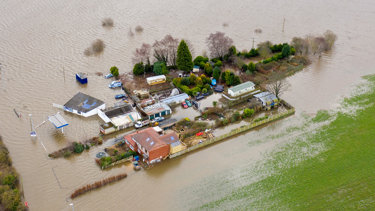Importance of spill awareness training as recent severe weather in the UK increases risk of environmental spill incidents
Published: 14 February 2025
In recent years, the UK has experienced a series of severe weather incidents, including heavy rainfall, flooding, and storms. These extreme weather events have not only disrupted daily life but also significantly increase the risk of environmental spills. The consequences of such spills can be devastating, leading to water pollution, harm to wildlife, and costly clean-up operations.

A brief look at the last four years alone – which includes the wettest 18 month’s in UK records – highlights the increasing frequency and severity of weather incidents impacting the UK:
- In February 2022, Storm Eunice struck. One of the most powerful storms to hit the UK in recent years, Storm Eunice brought widespread disruption with wind speeds exceeding 100 mph. The storm caused significant damage to infrastructure, including storage facilities, leading to several oil and chemical spills.
- Storm Babet, an intense extratropical cyclone, struck the UK in October 2023, causing significant damage and disruption. Heavy rainfall and strong winds led to widespread flooding and power outages. Some areas experienced two months' worth of rain in just two days, resulting in rivers exceeding record levels. Many businesses experienced severe flooding, leading to extensive property damage and disruption of operations. Small and medium-sized enterprises were hit particularly hard, with some areas seeing damages amounting to billions of pounds. Flooding spread pollutants from roads, industrial sites, and farms into rivers, contaminating water sources with harmful chemicals and affecting aquatic life.
- In April 2024, an unusually severe spring storm - Storm Kathleen – brought heavy rain and strong winds, particularly affecting southern and central England, and resulting in significant damage to industrial sites, leading to multiple spill incidents.
- Storm Éowyn, which struck the UK and Ireland in late January 2025, was the most powerful windstorm in over a decade, bringing severe impacts, including fatalities and widespread power outages. The storm, characterised by 100 mph gusts and explosive cyclogenesis, caused major disruption to transportation and infrastructure. Storm Éowyn also led to significant environmental issues; a sewage pollution alert was issued for Gorleston beach after a storm overflow was activated, and similarly, Southern Water deployed tankers to manage flows and prevent further pollution incidents in areas like Monxton.
- Storm Herminia, which followed closely after Storm Éowyn in late January 2025, brought severe weather conditions across the UK, Ireland, France, and Spain. It caused extensive flooding, particularly in regions like Somerset in the UK and Rennes in France, where it was described as the worst flooding in 40 years. High winds and heavy rainfall led to power outages, evacuations, and significant damage to infrastructure. Storm Herminia also exacerbated environmental issues with heavy rainfall and flooding overwhelming sewer systems and leading to increased incidents of sewage pollution in rivers and coastal areas.
The link between severe weather and spill incidents
As highlighted by these events, severe weather can exacerbate the likelihood of spills in several ways.

Heavy rainfall and flooding can overwhelm and damage drainage systems, leading to the overflow of hazardous substances into watercourses. Pollution can persist for an extended period following a flooding event if partially damaged assets are not properly inspected or checked. Strong winds and storms can damage storage facilities, causing leaks and spills of oil, fuel, and chemicals.
Key benefits of spill awareness training for businesses
The notable increase in both the frequency and severity of severe weather incidents in the UK, such as heavy rainfall, storms, and flooding have heightened the risk of environmental spills, so it’s more crucial than ever that businesses are prepared.
The best way to minimise spill incidents is through a comprehensive understanding of your site and mitigation of risks through proactive measures, such as regular inspections and maintenance. But when a spill incident does occur, spill awareness training equips employees with the skills to respond swiftly and effectively. This preparedness is vital during severe weather events, which can increase the likelihood of spills due to damaged infrastructure and overwhelmed drainage systems.
In addition, spill awareness training offers the following benefits:
- Regulatory compliance: Training ensures compliance with environmental regulations, such as COMAH and ISO 14001, which helps avoid fines and prosecution.
- Minimise environmental impact: Proper training helps employees to take immediate and appropriate action to contain and clean up spills, minimising the environmental impact. This is even more important during severe weather, when the risk of pollutants entering watercourses and affecting ecosystems is higher.
- Save costs: By ensuring a rapid response to spills through proper training, businesses can avoid the high costs associated with environmental clean-up, operational downtime, and potential fines. Investment in training should be considered a proactive measure that could save significant expenses in the long run.
- Enhance reputation: A commitment to environmental responsibility through spill awareness training can enhance a company's reputation. In the event of a spill, a well-prepared response can mitigate negative publicity and demonstrate that the business takes its environmental duties seriously.
- Improved health and safety: Training reduces the risk of injuries and health hazards for employees by ensuring they know how to handle hazardous materials safely.
- Increased employee confidence: Well-trained employees are more confident in their ability to manage spill incidents, which leads to quicker, more effective responses.
- Long-term sustainability: Spill awareness training supports long-term sustainability goals by promoting best practices in spill prevention and response. This aligns with broader environmental objectives and helps businesses contribute positively to their communities.
Ensuring readiness
Storms like Eunice, Babet, and Kathleen have shown how vulnerable infrastructure can be to extreme weather, leading to significant spill incidents and considerable environmental consequences.

While businesses must do all they can to proactively mitigate these risks, when spills do occur, spill awareness training is invaluable.
By investing in spill awareness training, businesses can ensure they are well-prepared to handle spill incidents, particularly in the face of increasingly severe weather which can occur during any season – not just in winter. This training not only protects the environment but also safeguards business operations, reputation, and compliance with regulations.
More from our Knowledge Hub
 Insights
InsightsEarth Day 2025: Enabling a sustainable future while supporting today’s infrastructure in an evolving energy landscape
 Insights
InsightsMitigating climate change risks through planned preventive maintenance
 Insights
InsightsProtective coatings: Safeguarding infrastructure against climate change
 Insights
InsightsDelivering the Water (Special Measures) Act: Supporting compliance and innovation
Environmental compliance today, creating a sustainable tomorrow
Helping you reduce risk to the environment and your operation by managing assets compliantly while achieving commercial, ESG, and net-zero goals.
Contact our experts
